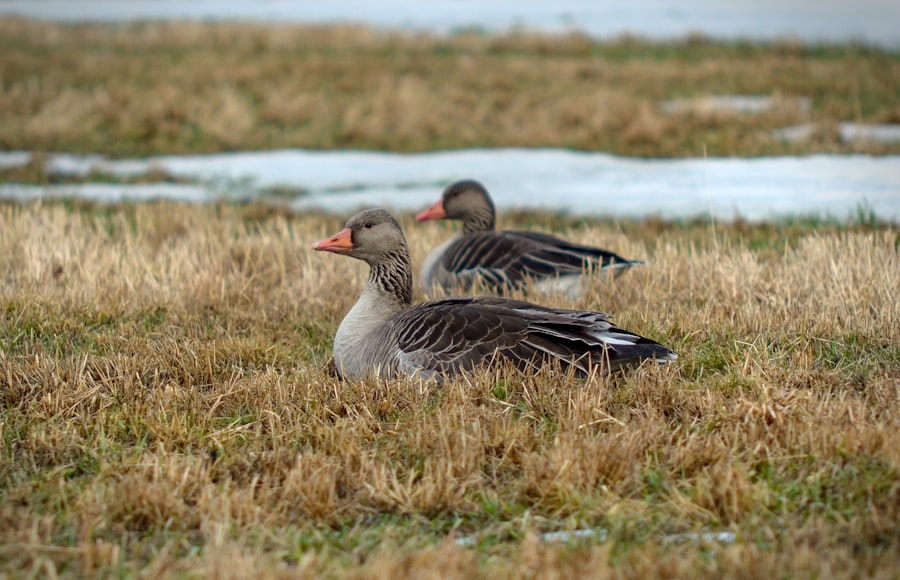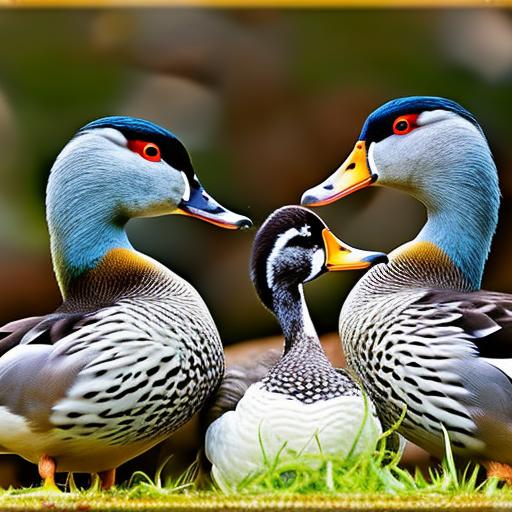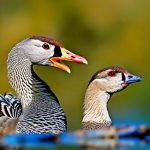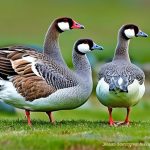Keeping ducks and geese together can be a rewarding experience for poultry enthusiasts. Both ducks and geese are waterfowl and have similar needs when it comes to housing, feeding, and health management. They can also coexist peacefully in the same environment, making it convenient for farmers and hobbyists to raise both species together. However, there are some important considerations to keep in mind when keeping ducks and geese together, including their differences in behavior, housing requirements, and nutritional needs. In this article, we will explore the differences between ducks and geese, considerations for keeping them together, housing and space requirements, feeding and nutrition, as well as health and disease management.
Key Takeaways
- Ducks and geese can be kept together, but there are important considerations to keep in mind to ensure their well-being.
- Ducks and geese have different behaviors, diets, and space requirements that need to be taken into account when keeping them together.
- When keeping ducks and geese together, it’s important to provide adequate housing and space to accommodate their different needs.
- Ducks and geese have different nutritional requirements, so it’s important to provide a balanced diet that meets the needs of both species.
- Health and disease management is crucial when keeping ducks and geese together, as they can be susceptible to different illnesses and conditions.
Differences Between Ducks and Geese
Ducks and geese are both waterfowl, but they have distinct differences in behavior, size, and physical characteristics. Ducks are generally smaller in size compared to geese, with shorter necks and a more upright posture. They are known for their webbed feet, which make them excellent swimmers. Ducks are also more vocal than geese, often quacking loudly to communicate with each other. On the other hand, geese are larger birds with longer necks and a more horizontal posture. They are known for their honking calls and are often more territorial than ducks. Geese are also known for their strong bond with their mate and can be more aggressive when protecting their nesting area. Understanding these differences is important when considering keeping ducks and geese together, as it can impact their interactions and social dynamics within the flock.
Considerations for Keeping Ducks and Geese Together
When keeping ducks and geese together, it is important to consider their different behavioral tendencies and social dynamics. Ducks are generally more social and can coexist peacefully with other waterfowl species, including geese. However, geese can be more territorial and may exhibit aggressive behavior towards ducks, especially during the breeding season. It is important to provide enough space and resources for both species to minimize competition and potential conflicts. Additionally, providing separate nesting areas for ducks and geese can help reduce territorial disputes and ensure the safety of the nesting birds. It is also important to monitor their interactions closely, especially during the breeding season, to prevent any aggressive behavior that may result in injuries or stress for the birds. By understanding these considerations, poultry enthusiasts can create a harmonious environment for both ducks and geese to thrive together.
Housing and Space Requirements
When keeping ducks and geese together, it is important to provide adequate housing and space to accommodate the needs of both species. Ducks and geese require shelter from predators and the elements, as well as access to water for swimming and foraging. The housing should be spacious enough to allow both species to move around freely and have separate areas for nesting and resting. Providing access to a pond or shallow water source is essential for both ducks and geese, as they are waterfowl and enjoy swimming and foraging in water. Additionally, the housing should be secure to protect the birds from predators such as foxes, raccoons, and birds of prey. By providing appropriate housing and space requirements, poultry enthusiasts can create a safe and comfortable environment for ducks and geese to live together harmoniously.
Feeding and Nutrition for Ducks and Geese
Ducks and geese have similar dietary needs, but there are some differences in their nutritional requirements that should be considered when keeping them together. Both species require a balanced diet that includes a combination of commercial poultry feed, fresh greens, grains, and access to insects and small invertebrates. Ducks are omnivores and enjoy a diet that includes a variety of protein sources such as fish meal or mealworms. They also require additional niacin in their diet to support their growth and overall health. Geese, on the other hand, are primarily herbivores and prefer a diet that includes a higher proportion of grass, leafy greens, and grains. It is important to provide separate feeding areas for ducks and geese to ensure that each species has access to the appropriate diet without competition or aggression. By understanding their feeding and nutritional needs, poultry enthusiasts can ensure that both ducks and geese receive the proper nutrients to support their health and well-being.
Health and Disease Management

When keeping ducks and geese together, it is important to implement a proactive health management plan to prevent the spread of diseases and ensure the overall well-being of the flock. Ducks and geese are susceptible to various poultry diseases such as avian influenza, duck viral enteritis, and botulism. It is important to practice good biosecurity measures by regularly cleaning and disinfecting the housing area, providing clean water sources, and monitoring the flock for any signs of illness or disease. Additionally, it is important to provide regular veterinary care and vaccinations to prevent common poultry diseases. By implementing a comprehensive health management plan, poultry enthusiasts can minimize the risk of disease outbreaks and ensure the long-term health of their ducks and geese.
Conclusion and Final Considerations
In conclusion, keeping ducks and geese together can be a rewarding experience for poultry enthusiasts, but it requires careful consideration of their behavioral tendencies, housing requirements, feeding and nutritional needs, as well as health management. By understanding the differences between ducks and geese, providing adequate housing and space requirements, offering a balanced diet that meets their nutritional needs, and implementing a proactive health management plan, poultry enthusiasts can create a harmonious environment for both species to thrive together. With proper care and attention to their specific needs, ducks and geese can coexist peacefully in the same environment, providing entertainment, companionship, and potentially even a sustainable source of eggs or meat for the farm or homestead.
If you’re considering keeping ducks and geese together, it’s important to understand their compatibility and care requirements. In a related article on PoultryWizard, you can learn about the mating season for turkeys and how to manage their breeding habits. Understanding the behaviors and needs of different poultry species can help you create a harmonious environment for all your feathered friends. Check out the article here to gain valuable insights into turkey breeding and care.
FAQs
Can I keep ducks and geese together?
Yes, ducks and geese can be kept together in the same enclosure as they are both waterfowl and have similar housing and dietary needs.
Do ducks and geese get along?
In general, ducks and geese can get along well when kept together. However, it is important to monitor their interactions to ensure that there is no aggression or bullying between the two species.
What should I consider when keeping ducks and geese together?
When keeping ducks and geese together, it is important to provide a large enough enclosure with access to water for swimming and foraging. Additionally, it is important to provide adequate shelter and nesting areas for both species.
What are the dietary needs of ducks and geese?
Ducks and geese have similar dietary needs and can be fed a diet of commercial waterfowl feed, supplemented with fresh greens, grains, and access to forage.
Are there any health concerns when keeping ducks and geese together?
One potential health concern when keeping ducks and geese together is the risk of disease transmission. It is important to practice good biosecurity measures and monitor the health of both species to prevent the spread of diseases.
Meet Walter, the feathered-friend fanatic of Florida! Nestled in the sunshine state, Walter struts through life with his feathered companions, clucking his way to happiness. With a coop that’s fancier than a five-star hotel, he’s the Don Juan of the chicken world. When he’s not teaching his hens to do the cha-cha, you’ll find him in a heated debate with his prized rooster, Sir Clucks-a-Lot. Walter’s poultry passion is no yolk; he’s the sunny-side-up guy you never knew you needed in your flock of friends!







